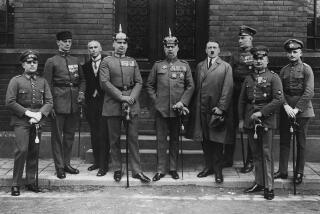Long Arm of Kadafi’s Law, Too? : Pursuits: OK, so Bush got Noriega, but now Libya wants Reagan, China wants the Dalai Lama and Sweden’s looking to settle an old grudge against Israel.
- Share via
The Brezhnev Doctrine and the Cold War melted away in a rush, and the world wondered what new principle of international conduct would follow. To fill the doctrine gap, there emerged in late 1989 the principle of the Long Arm of the Law.
There is dispute about who deserves credit for this invention. Conventionally, of course, the indictment of Gen. Manuel Noriega in Florida and the invasion of Panama are taken to be the founding extension of the Long Arm of the Law, for which President Bush is given credit.
Some argue, however, that the precedent was set by Ayatollah Ruhollah Khomeini when he condemned the British writer Salman Rushdie to death for committing blasphemy--a crime, after all, under Iranian law. Purists retort that this death sentence amounted to overreaching; they grant that the Ayatollah would have been within his rights had he limited himself to sending a squad of soldiers to London to escort Rushdie to Tehran for a blasphemy trial.
The doctrine began to assume its larger proportions on April 28, 1990, when a team of Libyan “marshals” was detained on arrival at Los Angeles Airport; on their arrest, the armed Libyans brandished subpoenas demanding that former President Ronald Reagan stand trial in Tripoli for the murder of Col. Moammar Kadafi’s daughter during the U.S. bombing raid on Kadafi’s tent in 1986. Kadafi was invoking Long Arm, which he smirkingly called the Bush Doctrine, and its Sauce-for-the-Goose Corollary, for which he claimed the sanction of international law.
The White House promptly issued a statement pointing out that the Libyan indictment had not been properly drawn, and that, moreover, a statute of limitations applied to bombing raids and other acts of regrettable violence launched before Dec. 31, 1989.
The White House added that the choice of President James Monroe’s birthday for Libya’s act of war was an obvious provocation. Kadafi responded angrily that the well-known Sinatra Doctrine enabled every sovereign state to enforce its own law by its own long arm and that, in any event, the actual charge against Reagan was nothing more than involuntary manslaughter, for which the maximum penalty is only five years of tent arrest.
Kadafi backed down and Washington relaxed--until Beijing’s India incursion of May 1, 1990, aiming to bring the Dalai Lama to trial on charges of destabilizing the Tibetan sector of China’s sovereign territory. India resisted successfully, but the Chinese further offended the White House by invoking what they called the K’ang Hsi Doctrine after the Chinese emperor who had absorbed Tibet into China in 1720. To demonstrate its displeasure, the Administration announced its intention to disconnect all coffee-makers on American fighter-bombers leased to Beijing for a period of not less than 90 days.
Soon, other nations extended their own long arms, thereby demonstrating that the United States was a genuine trend-setter in international law. First came the joint Zambia-Botswana-Namibia-Mozambique legion, which crossed the South African border aiming to seize the white leaders and bring them to war-ravaged Maputo for trial.
Then came the Iranian feint into Soviet Azerbaijan, leading to a visit to the front by Soviet President Mikhail Gorbachev, his seizure by a crack Iranian helicopter squad and his subsequent trial in Tehran on charges of being the Greatest Satan Around.
The doctrine seemed to have gone too far when Swedish troops parachuted into Jerusalem in search of Israelis who had assassinated the United Nations mediator Count Folke Bernadotte in 1948.
It was at this point that dissension surfaced in Washington. State Department moderates proposed to revise the Long Arm of the Law Doctrine to read: Troops can legitimately be dispatched to another nation only to lay hands on a brutal dictator formerly on the payroll of the nation doing the dispatching. But this trial balloon was shot down when neo-Brezhnevites in Moscow were heard to menacingly suggest that the Red Army would have been within its rights had it, at the time of the Czechoslovakia invasion in 1968, also invaded Romania.
New television shows went into global syndication: “Unindicted Co-Conspirators!,” “L.A. Long Arm,” “Peoples’ Marshals.” “Meaningful Pursuits” became the party game of choice and buttons circulated around the world in 12 languages, saying “I Am Not a Wimp.”
More to Read
Sign up for Essential California
The most important California stories and recommendations in your inbox every morning.
You may occasionally receive promotional content from the Los Angeles Times.












